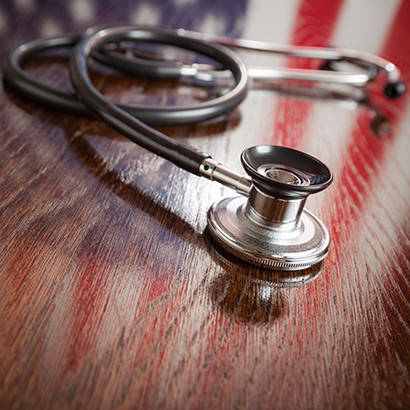
With the Affordable Care Act’s (ACA) open enrollment period in full swing, and the 2016 election results just settling in, healthcare issues are definitely on the minds of many Americans right now. For over 18 months, Presidential candidates (Donald J. Trump (R), Hillary Clinton (D), Jill Stein (G), and Gary Johnson (L)) discussed the future of the ACA.
Now that the November elections are behind us, we can look a little further into President-elect Trump’s healthcare plans and dive into his ideas about keeping Americans healthy. Below, you’ll find a quick overview of President-elect Trump’s plans for the ACA and healthcare integration during the next administration. This note only scratches the surface of what issues may arise during the upcoming Congress, but it’s clear that park and recreation agencies’ preventative health efforts will continue to play a critical role as the next administration works to provide better care at a lower cost for all Americans.
Overview
At the heart of President-elect Trump’s healthcare proposal, which he’s listed as one of his top three priorities, is an effort to “broaden healthcare access, make healthcare more affordable and improve the quality of care available to all Americans.”
While this expression of support hasn’t been put into legislative text or actionable plans, President-elect Trump has put forward a framework of eight initiatives that can be examined.
- Repeal the ACA
- Expand the use of health savings accounts
- Require transparency in healthcare service prices
- Allow the sale of insurance across state lines
- Allow the re-importation of prescription drugs
- Allow Medicare to negotiate drug prices
- Convert federal Medicaid funding to block grants
- Make health insurance premiums tax deductible
The two most relevant provisions for park and recreation agencies are repealing the ACA and expanding the use of health savings accounts.
Repealing the ACA
While the ACA increased the number of Americans who have health insurance and improved protections for consumers, it also raised Medicaid costs for states, led to fewer individual market insurance options in certain regions, and also created regulatory questions for park and recreation agencies about insuring part-time employees.
Since its implementation, the mantra of Congressional Republicans regarding the ACA has been “repeal and replace.” While we don’t know for sure which facets of the ACA President-elect Trump will eliminate aside from the individual mandate, we can look at a similar effort that passed in both chambers of Congress and was vetoed by President Obama last December for guidance.
That bill, H.R. 3762, repealed the medical device tax and Cadillac tax on high value health plans, Medicaid expansion requirements, and tax subsidies that help people purchase insurance. Most relevant for park and recreation agencies, the bill changed the fines for the noncompliance with the individual and employer mandates to $0 – effectively rendering the ACA’s primary enforcement mechanisms useless.
The ACA repeal roadmap is still taking shape. Due to the fact that the repeal effort indirectly impacts almost every American and directly affects over 20 million people who gained coverage and more than $3 trillion of our economy, the process will be slow and deliberate.
Furthermore, given that individual pieces of the law are very popular among all Americans – especially banning insurance company denials of people with preexisting conditions – the transition period could be quite lengthy to protect people who are currently covered under the ACA.
Expanding the Use of HSAs
Regarding efforts to replace the ACA, President-elect Trump is expected to lean heavily on health savings accounts (HSAs), among other policy options. HSAs are tax-advantaged medical savings accounts that can be used to pay for certain medical expenses. Pre-tax dollars are deposited into these accounts and used to pay for various items including prescriptions, medical procedures, bandages, etc.
Once again, we’ll have to take cues from outside documents to learn more. Speaker Ryan’s healthcare plan provides some additional guidance as it seeks to pair HSAs with high deductible health plans (HDHPs) in order to protect against catastrophic expenses and give Americans more control over their day-to-day health costs.
More importantly, the potential emphasis on HSAs during the next administration bodes well for one of NRPA’s top legislative priorities, the PHIT Act. The PHIT Act helps individuals avoid the out-of-pocket costs of physical activity by allowing up to $1,000 ($2,000 for couples) from HSAs to pay for organized, individual, and team sports, exercise programs, and recreation activities. NRPA sees this as an opportunity to remove financial barriers that some Americans have to getting active, and to change people’s perceptions about preventative health.

Looking Forward
Right now, too many communities don’t have local access to good doctors or hospitals – especially in rural and low-income areas where preventable chronic disease rates (obesity, diabetes, heart disease, arthritis, etc.) are higher. This reality underpins the work many park and recreation agencies do – offering preventative health activities like safe and welcoming places to walk, exercise and play – to make their communities healthier and lower rates of chronic disease.
Although no specific plan has been drafted regarding the importance of community-based organizations like park and recreation agencies to improving the health of Americans, President-elect Trump’s belief in broadening healthcare access to improve public health is a step in the right direction. Furthermore, promoting the use of HSAs will supplement the work of NRPA members like you to lower rates of obesity, arthritis and other preventable chronic diseases.
As we move into the Presidential transition, NRPA’s Public Policy Team looks forward to working with the Trump administration to put forth concrete plans for better integrating community-based organizations, like park and recreation agencies, into the healthcare system.
NRPA’s Public Policy Team is working hard to make sure the next administration understands the value of prevention, mobility, and healthy eating – all NRPA priorities when it comes to lowering the cost of healthcare and improving quality of life for Americans.
You can follow our efforts to keep the Trump administration abreast of the important role park and recreation agencies play across America via social media.

